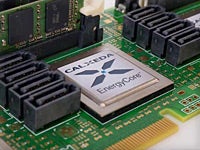Two years ago, Calxeda shook up the Server silicon marketplace by suggesting that ARM is a viable server architecture.
Calxeda is now updating its ARM linueup with the new ECX-2000 System on a Chip (SoC).  Steve Croce, Product Marketing Manager at Calxeda, told ServerWatch that the ECX-2000 is the successor to Calxeda’s ECX-1000 chip.
Steve Croce, Product Marketing Manager at Calxeda, told ServerWatch that the ECX-2000 is the successor to Calxeda’s ECX-1000 chip.
“The two will overlap for a period, but ultimately the ECX-2000 will outlive the ECX-1000,” Croce said.
The ECX-2000 includes ARM Cortex A5 cores with a clock speed of up to 1.8 GHz. The initial Calxeda SoC only supported ARM Cortex cores with clock speeds of up to 1.4 GHz.
Calxeda is also including a new generation of its Fleet Fabric technology as part of the ECX-2000 release.
“The Fleet Fabric name applies to our fabric technology that is shared between all of our products,” Croce said. “The ECX-2000 contains the second generation of this technology and adds additional features like Energy Efficient Ethernet (EEE), improved power efficiency/management, and additional routing algorithms for more deterministic performance across the fabric.”
The Calxeda ARM architecture is being adopted by HP as part of its Project Moonshot hyper scale server platform. Moonshot also supports Intel’s latest generation low-power Atom Avoton chips as well.
Earlier this year, Calxeda co-founder Larry Wikelius told ServerWatch in a video interview that his company has spurred the competitive market for low-power server architecture.
In terms of use-cases, Calxeda and its partners see the new SoC as being a cloud enabling. The latest Ubuntu 13.10 Linux server has been certified on the ECX-2000 SoC already to run the new OpenStack Havana cloud platform.
Sarita
Moving forward, Calxeda is also providing some visibility into its future SoC server designs. Calxeda now has plans for a new 64-bit ARM Cortex A57 platform dubbed “Sarita.” Croce is optimistic about the performance gains that Sarita will provide.
“We’re conservatively expecting another 50 percent improvement, but some factors like launch frequencies may improve upon that number,” Croce said.
Sean Michael Kerner is a senior editor at ServerWatch and InternetNews.com. Follow him on Twitter @TechJournalist.

